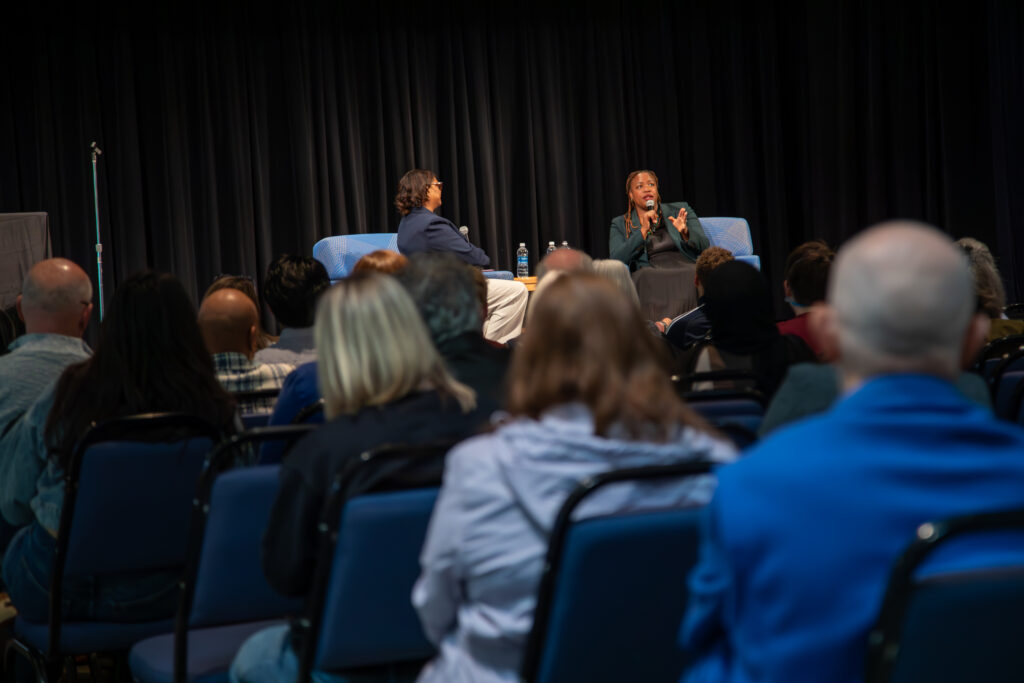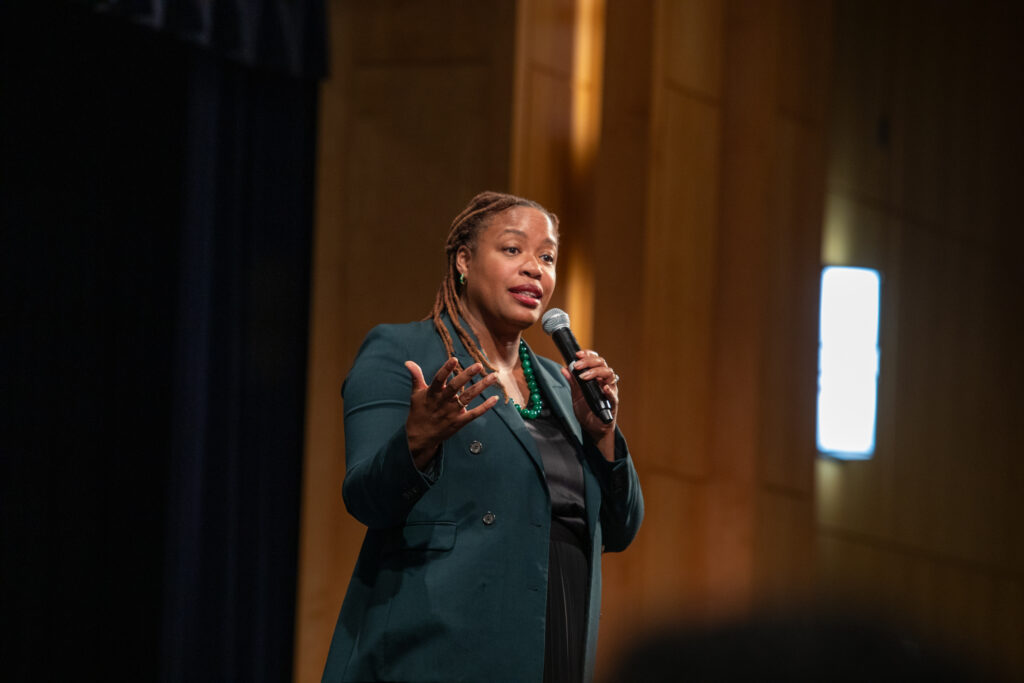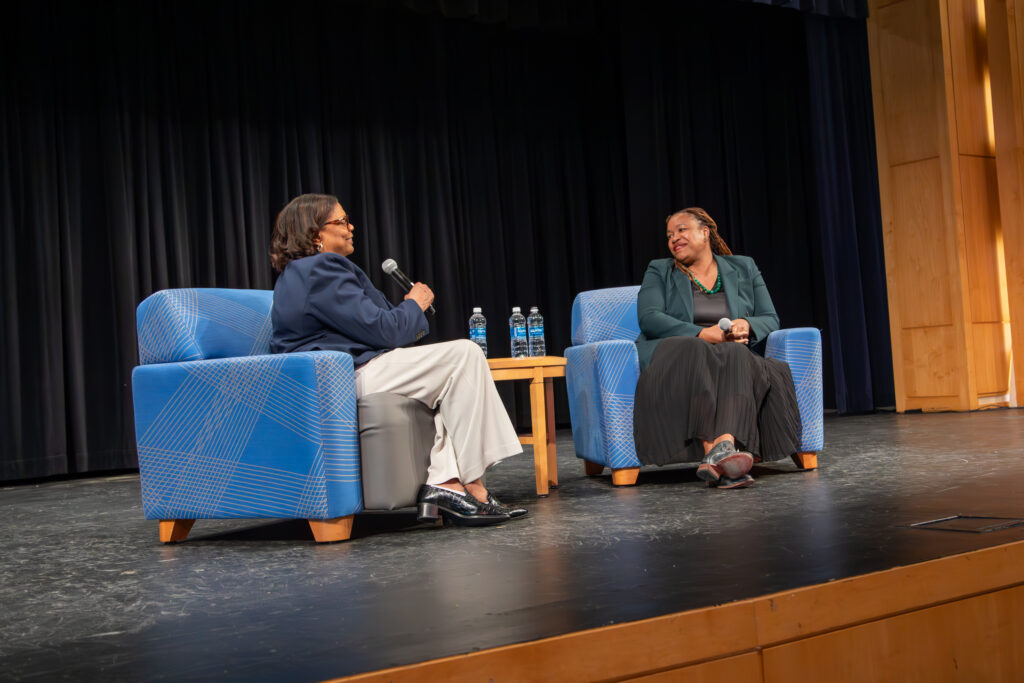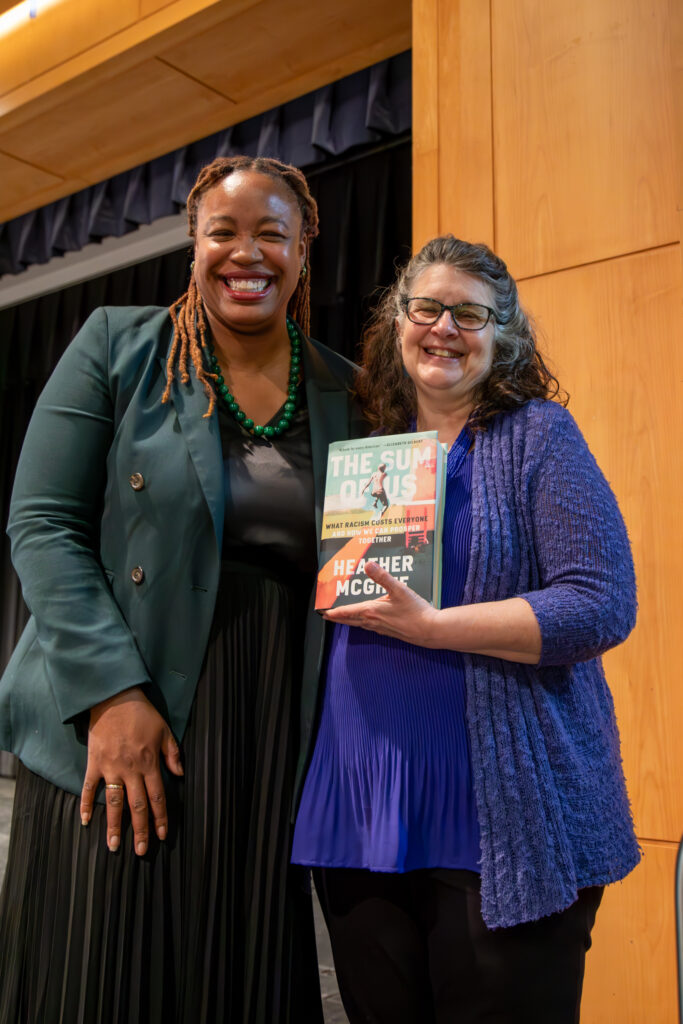
On May 20, Clark College welcomed acclaimed author and policy expert Heather McGhee for a powerful conversation about equity, opportunity, and the cost of systemic racism in America. Drawing from her best-selling book The Sum of Us: What Racism Costs Everyone and How We Can Prosper Together, McGhee urged the audience to recognize this moment as a national inflection point—and to take collective action toward building and shaping a more inclusive future.
With a strong background in economic policy, McGhee focused on pressing interconnected issues such as the affordability of education, poverty, healthcare, and sustainable energy solutions. “When I set out on this journey to write The Sum of Us, I was thinking about the present and the future. How much you can’t really understand where you are, standing in a moment, unless you understand the steps that you took to get to a place.”
Zero-sum game
McGhee goes back to the historic Bacon’s Rebellion in 1793 because the laws that followed the defeat of Bacon’s Rebellion created a zero-sum story. “These laws told the colonial plantation elite that the European landless and indentured folks that ‘your freedom, your citizenship, your process and your humanity is contingent on there being someone beneath you.’ And if they rise, it is a threat to you.”
The idea of a zero-sum game is that there can be no mutual progress—if one player scores a point, the other player loses a point.
McGhee explained that we need to have all the players scoring on the team, “You want all of the players on the field scoring points for your team, where inequality is actually bad for growth. Right?”
“It is one of the loudest and oldest stories in America… that progress of people of color has to come at the expense of white folks.” She explained how these narratives foster division and hinders collective progress, pointing out that “the black-white economic divide has cost the U.S. GDP $16 trillion over the last 20 years.”
McGhee’s call to action

McGhee called for unity across diverse backgrounds, urging individuals to challenge this divisive narrative. “We need to organize in a way that is explicitly cross-racial,” she urged, emphasizing the importance of cooperation and mutual progress in overcoming systemic barriers.
Community engagement emerged as another vital theme in McGhee’s address. She noted, “Every scholar of authoritarianism has observed that… being in regular contact with other people is an essential part of the formula that defeats autocracy.” This statement highlights the significance of interpersonal connections and support networks, particularly following the social isolation exacerbated by the pandemic.
Drawing inspiration from historical movements, particularly the civil rights movement, McGhee reminded the audience of the resilience demonstrated by those who came before us. She asserted, “The first generation to defeat American fascism was the abolition generation,” drawing parallels between past struggles and the current fight for justice and equality. McGhee encouraged her audience not to lose hope, stating, “They kept fighting. They kept teaching their children to fight,” inspiring listeners to continue advocating for change.
In conclusion, McGhee’s reminds us of the responsibilities we hold as individuals and as a community. “You don’t have to do it all the time… but there will come a moment when you have a choice to make,” she concluded, encouraging everyone to be prepared to speak up and stand for justice when the opportunity arises.
Q&A with Dr. Edwards and the audience

Following her speech, Heather McGhee engaged in a Q&A with President Dr. Karin Edwards and then opened it to the audience for questions. Topics included: environmental racism, psychological and emotional costs of racism, and truth and reconciliation.
McGhee explained how the exploitation of natural resources mirrors the historical exploitation rooted in chattel slavery. She stated, “The very orientation that our industrialized capitalist society has towards the Earth comes from the same willingness to exploit.” She elaborated on this by discussing “sacrifice zones,” areas where pollution is concentrated due to a lack of political power to resist industrial developments. McGhee highlighted a grassroots effort in Memphis, where a diverse coalition successfully fought against a natural gas pipeline that threatened both the local Black community and a vital aquifer, demonstrating how environmental issues can unite disparate groups.
McGhee pointed out that while many have made strides in education and business, systemic barriers remain. She cited research showing that “the average Black college graduate has less household wealth than the average white high school dropout,” illustrating the deep-rooted economic disparities that perpetuate inequality. McGhee emphasized that racism affects everyone, not just marginalized communities, and that its economic impact extends widely.
McGhee advocated for a collective effort to acknowledge the nation’s complex racial history, emphasizing the need for organized healing processes across communities. She noted that many societies have successfully navigated their traumas through similar processes, and she called for educational reforms that accurately portray America’s past, stating, “Our country should know our own dark history, and we shouldn’t be lied to in our textbooks.”

Susan Parrish (right), retired Clark College staff writer, was in the audience. Susan’s story was featured in The Sum of Us. When Susan was interviewed in 2018, she was recently divorced, laid off from her communications job, had two months to sell her house when the real estate market was at its lowest in decades, and she wasn’t making a living wage. Three years later, she found her story among the many others who shared how they’d lost so much during the Great Recession.
Attendees also raised questions about personal experiences with racism and strategies for fostering dialogue across divides. McGhee emphasized the importance of finding common ground and shared values, encouraging individuals to approach conversations with empathy and a willingness to listen. She acknowledged the challenges of discussing sensitive topics within families and communities, but asserted that doing so is crucial for progress.
In closing, McGhee reiterated the importance of solidarity, particularly for vulnerable communities, urging everyone to recognize the humanity of immigrant communities who seek a better life in the U.S. “The most powerful people in the world profit from their exploitation and from a fear of one another,” she remarked, underscoring the need for collective action to uplift marginalized voices and confront systemic inequities.
Learn more
- Heather McGhee’s website here
- Book discussion guide here
- Young readers’ edition here
- The Sum of Us podcast is produced by the Obamas’ production company, Higher Ground, and Futuro Studios. Listen here.
- The Sum of Us book is available for purchase at the Clark College Bookstore
- Link to Susan Parrish’s HuffPost story about her wild life of living tiny in rural Eastern Oregon.
Photos: Clark College/Jenny Shadley












